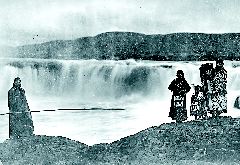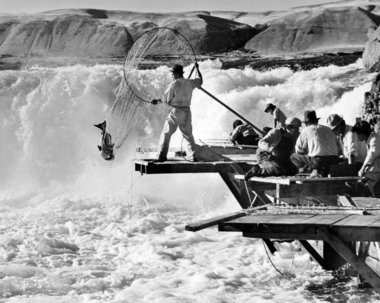forum
library
tutorial
contact

Federal Agencies to Update 'Flawed' Study
on Columbia, Snake River Dams
by Michaela Bourgeois
KOIN 6 News, December 30, 2024
|
the film forum library tutorial contact |

|
Federal Agencies to Update 'Flawed' Study
by Michaela Bourgeois
|
The study could help the Columbia's 'imperiled' salmon population,
according to nonprofit Earthjustice
 PORTLAND, Ore. (KOIN) -- Two federal agencies have announced plans to update an environmental study on the Columbia and Snake River dams -- a move lauded by environmental advocates who say the new study could help local tribes and save the Columbia Basin's salmon population.
PORTLAND, Ore. (KOIN) -- Two federal agencies have announced plans to update an environmental study on the Columbia and Snake River dams -- a move lauded by environmental advocates who say the new study could help local tribes and save the Columbia Basin's salmon population.
In a joint notice of intent on December 18 -- which was first reported by the Idaho Capital Sun -- the United States Army Corps of Engineers and the Bureau of Reclamation announced their plans to issue a supplemental environmental impact statement (EIS) on the dams after new reports detailed their dangers and ways to improve habitats surrounding the basin.
The update comes as the initial study currently informs how 14 dams are managed in the basin by the federal government.
The new information leading to the update includes data from a June 2024 report from the U.S. Department of the Interior that found ongoing harm to local tribes from Columbia Basin dams, along with a 2022 report by the National Oceanic and Atmospheric Administration, which detailed ways to restore a healthy salmon habitat.
Earthjustice -- a nonprofit organization -- said revising the initial "flawed" study from 2020 could lead to changes in the Columbia Basin that can "help prevent extinction and restore imperiled salmon and steelhead populations to healthy and harvestable abundance."
The nonprofit has previously noted the Columbia and Snake River dams not only diminish salmon habitats and can kill them as they pass though the dams but also limit salmon harvesting opportunities for local tribes and conflict with their treaty rights.
"It's clearer than ever that we need a major course change, with new information showing many salmon populations in the basin hovering near extinction," said Earthjustice Senior Attorney Amanda Goodin. "The information available now provides us with all we need to chart a successful path forward. We know we can avoid extinction and rebuild salmon and native fisheries to a healthy and harvestable abundance if we commit to the centerpiece actions they need, including breaching the four lower Snake River dams and replacing their services. We also know we have no time to lose."
"At least four Columbia and Snake River salmon and steelhead stocks have already gone extinct and 13 others -- including all four remaining Snake River stocks -- are listed under the Endangered Species Act. We must have a strong study and plan based on the best available science that will ensure restoration of imperiled native fish populations to healthy and harvestable levels," added Northwest Sportfishing Industry Association Policy Director Liz Hamilton in an Earthjustice press release. "Revising this study is the logical next step toward meaningful change that complies with the law and the needs of the fish."
The current dam management plan was challenged in court by plaintiffs represented by Earthjustice, the State of Oregon, and the Nez Perce tribe. That lawsuit is under a legal pause as the parties work on an updated fisheries restoration plan, the nonprofit said.
 The announcement from the federal agencies also follows an agreement signed by the federal government, Washington, Oregon, four lower Columbia Basin tribes, along with fishing and conservation groups represented by Earthjustice.
The announcement from the federal agencies also follows an agreement signed by the federal government, Washington, Oregon, four lower Columbia Basin tribes, along with fishing and conservation groups represented by Earthjustice.
That agreement is based on the Columbia Basin Restoration Initiative, which is a plan to restore the basin's native fisheries with support from the federal government.
Now, the federal agencies are seeking public input until March 20, 2025, as they prepare the supplemental EIS.
A spokesperson for the Bureau of Reclamation told KOIN 6 News on Monday, "The goal of Reclamation and USACE is to balance the Columbia River System's authorized purposes in accordance with all relevant laws and regulations. At this stage in the process, we need input from the public to determine the scope and significant issues to be analyzed in depth in the EIS."
The U.S. Army Corps of Engineers and the Bureau of Reclamation will also hold at least three virtual public meetings on their work the week of February 10, 2025.
As the agencies prepare for the EIS, Bill Arthur with the environmental organization Sierra Club's Snake/Columbia River Campaign, issued a statement with Earthjustice, noting breaching dams could be an option moving forward.
"We appreciate the decision to do a supplemental process to address these flaws and evaluate stronger measures in how we operate the hydropower system including breaching the lower Snake River dams," Arthur said. "Extinction is not an option and that is the trajectory we are on without stronger actions."
learn more on topics covered in the film
see the video
read the script
learn the songs
discussion forum
